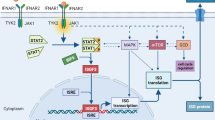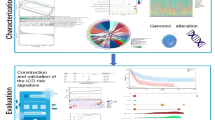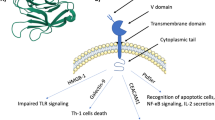Abstract
Nasopharyngeal carcinoma (NPC) is a highly malignant tumor, associated with poor patient prognoses, and high rates of morbidity and mortality. Currently, immune checkpoint therapy has brought new treatment strategy for NPC. The inducible T cell co-stimulator (ICOS) belongs to the B7-CD28 immunoglobulin superfamily, which is currently the subject of intense study due to great successes gained in treatment of different malignancies by disrupting their family members. However, the role of ICOS played in NPC remains poorly understood. Immunohistochemistry (IHC) was stained with the ICOS specific antibody and ICOS expression is decreased in patients with either lymphatic or distant metastasis and inversely associated with TNM stage of NPC patients. Importantly, high ICOS expression is significantly correlated with overall survival (OS) of NPC patients (N = 185, p < 0.001), and ICOS expression is also proved to be an independent prognostic factor by multivariate analysis. Surgical excised fresh NPC specimens (N = 185) were homogenized to analyze the specific cytokine expression by ELISA assay. ICOS expression level is associated with increased cytotoxic T lymphocyte number and high interferon IFNγ expression, the characteristics of Th1 cells. In addition, the correlation between the percentage of ICOS+ T cells in tumor tissue and survival was detected. Conclusively, expression of ICOS is associated with improved survival in NPC and percentage of ICOS+ cells acting as Th1 cells in primary tumor tissue may be a clinical biomarker for good prognosis of NPC patients.



Similar content being viewed by others
References
Lee AW, Ma BB, Ng WT, Chan AT (2015) Management of nasopharyngeal carcinoma: current practice and future perspective. J Clin Oncol 33(29):3356–3364. https://doi.org/10.1200/JCO.2015.60.9347
Mao YP, Xie FY, Liu LZ, Sun Y, Li L, Tang LL, Liao XB, Xu HY, Chen L, Lai SZ, Lin AH, Liu MZ, Ma J (2009) Re-evaluation of 6th edition of AJCC staging system for nasopharyngeal carcinoma and proposed improvement based on magnetic resonance imaging. Int J Radiat Oncol Biol Phys 73(5):1326–1334. https://doi.org/10.1016/j.ijrobp.2008.07.062
Zheng L, Cao C, Cheng G, Hu Q, Chen X (2017) Cytomembranic PD-L1 expression in locoregionally advanced nasopharyngeal carcinoma. Onco Targets Ther 10:5483–5487. https://doi.org/10.2147/OTT.S152007
Hua YJ, Han F, Lu LX, Mai HQ, Guo X, Hong MH, Lu TX, Zhao C (2012) Long-term treatment outcome of recurrent nasopharyngeal carcinoma treated with salvage intensity modulated radiotherapy. Eur J Cancer 48(18):3422–3428. https://doi.org/10.1016/j.ejca.2012.06.016
Kong L, Wang L, Shen C, Hu C, Wang L, Lu JJ (2016) Salvage Intensity-Modulated Radiation Therapy (IMRT) for locally recurrent nasopharyngeal cancer after definitive IMRT: a novel scenario of the modern era. Sci Rep 6:32883. https://doi.org/10.1038/srep32883
Chen C, Fee W, Chen J, Chan C, Khong B, Hara W, Goffinet D, Li D, Le QT (2014) Salvage treatment for locally recurrent nasopharyngeal carcinoma (NPC). Am J Clin Oncol 37(4):327–331. https://doi.org/10.1097/COC.0b013e318277d804
Karam I, Huang SH, McNiven A, Su J, Xu W, Waldron J, Bayley AJ, Kim J, Cho J, Ringash J, Hope A, Chen E, Chan B, Goldstein D, O'Sullivan B, Giuliani ME (2016) Outcomes after reirradiation for recurrent nasopharyngeal carcinoma: north American experience. Head Neck 38(Suppl 1):E1102–E1109. https://doi.org/10.1002/hed.24166
Zhang Y, Luo Y, Qin SL, Mu YF, Qi Y, Yu MH, Zhong M (2016) The clinical impact of ICOS signal in colorectal cancer patients. Oncoimmunology 5(5):e1141857. https://doi.org/10.1080/2162402X.2016.1141857
Sharpe AH, Freeman GJ (2002) The B7-CD28 superfamily. Nat Rev Immunol 2(2):116–126. https://doi.org/10.1038/nri727
Ceeraz S, Nowak EC, Noelle RJ (2013) B7 family checkpoint regulators in immune regulation and disease. Trends Immunol 34(11):556–563. https://doi.org/10.1016/j.it.2013.07.003
Swallow MM, Wallin JJ, Sha WC (1999) B7h, a novel costimulatory homolog of B7.1 and B7.2, is induced by TNFalpha. Immunity 11(4):423–432
Faget J, Bendriss-Vermare N, Gobert M, Durand I, Olive D, Biota C, Bachelot T, Treilleux I, Goddard-Leon S, Lavergne E, Chabaud S, Blay JY, Caux C, Menetrier-Caux C (2012) ICOS-ligand expression on plasmacytoid dendritic cells supports breast cancer progression by promoting the accumulation of immunosuppressive CD4+ T cells. Cancer Res 72(23):6130–6141. https://doi.org/10.1158/0008-5472.CAN-12-2409
Faget J, Sisirak V, Blay JY, Caux C, Bendriss-Vermare N, Menetrier-Caux C (2013) ICOS is associated with poor prognosis in breast cancer as it promotes the amplification of immunosuppressive CD4+ T cells by plasmacytoid dendritic cells. Oncoimmunology 2(3):e23185. https://doi.org/10.4161/onci.23185
Hutloff A, Dittrich AM, Beier KC, Eljaschewitsch B, Kraft R, Anagnostopoulos I, Kroczek RA (1999) ICOS is an inducible T-cell co-stimulator structurally and functionally related to CD28. Nature 397(6716):263–266. https://doi.org/10.1038/16717
McAdam AJ, Chang TT, Lumelsky AE, Greenfield EA, Boussiotis VA, Duke-Cohan JS, Chernova T, Malenkovich N, Jabs C, Kuchroo VK, Ling V, Collins M, Sharpe AH, Freeman GJ (2000) Mouse inducible costimulatory molecule (ICOS) expression is enhanced by CD28 costimulation and regulates differentiation of CD4+ T cells. J Immunol 165(9):5035–5040
Akbari O, Stock P, Meyer EH, Freeman GJ, Sharpe AH, Umetsu DT, DeKruyff RH (2008) ICOS/ICOSL interaction is required for CD4+ invariant NKT cell function and homeostatic survival. J Immunol 180(8):5448–5456
Fu T, He Q, Sharma P (2011) The ICOS/ICOSL pathway is required for optimal antitumor responses mediated by anti-CTLA-4 therapy. Cancer Res 71(16):5445–5454. https://doi.org/10.1158/0008-5472.CAN-11-1138
Coyle AJ, Lehar S, Lloyd C, Tian J, Delaney T, Manning S, Nguyen T, Burwell T, Schneider H, Gonzalo JA, Gosselin M, Owen LR, Rudd CE, Gutierrez-Ramos JC (2000) The CD28-related molecule ICOS is required for effective T cell-dependent immune responses. Immunity 13(1):95–105
Yoshinaga SK, Whoriskey JS, Khare SD, Sarmiento U, Guo J, Horan T, Shih G, Zhang M, Coccia MA, Kohno T, Tafuri-Bladt A, Brankow D, Campbell P, Chang D, Chiu L, Dai T, Duncan G, Elliott GS, Hui A, McCabe SM, Scully S, Shahinian A, Shaklee CL, Van G, Mak TW, Senaldi G (1999) T-cell co-stimulation through B7RP-1 and ICOS. Nature 402(6763):827–832. https://doi.org/10.1038/45582
Zhang Y, Lv D, Kim HJ, Kurt RA, Bu W, Li Y, Ma X (2013) A novel role of hematopoietic CCL5 in promoting triple-negative mammary tumor progression by regulating generation of myeloid-derived suppressor cells. Cell Res 23(3):394–408. https://doi.org/10.1038/cr.2012.178
Burris HA, Callahan MK, Tolcher AW, Kummar S, Falchook GS, Pachynski RK, Tykodi SS, Gibney GT, Seiwert TY, Gainor JF, LoRusso P, Hilbert J, Apgar JF, Hua F, Burke JM, Lazaro M, Clancy M, Ding B, Trehu EG, Yap TA (2017) Phase 1 safety of ICOS agonist antibody JTX-2011 alone and with nivolumab (nivo) in advanced solid tumors; predicted vs observed pharmacokinetics (PK) in ICONIC. J Clin Oncol 35(15_suppl):3033–3033. https://doi.org/10.1200/JCO.2017.35.15_suppl.3033
Angevin E, Bauer TM, Ellis CE, Gan H, Hall R, Hansen A, Hoos A, Jewell RC, Katz J, Martin-Liberal J, Maio M, Mayes PA, Mazumdar J, Millward M, Rischin D, Schellens JH, Yadavilli S, Zhou H (2017) Abstract CT039: INDUCE-1: a phase I open-label study of GSK3359609, an ICOS agonist antibody, administered alone and in combination with pembrolizumab in patients with selected, advanced solid tumors. Cancer Res 77(13 Supplement):CT039–CT039. https://doi.org/10.1158/1538-7445.Am2017-ct039
Author information
Authors and Affiliations
Corresponding author
Ethics declarations
Conflict of Interest
None.
Rights and permissions
About this article
Cite this article
Zhang, G., Xu, Y. & Zhou, H. The Infiltration of ICOS+ Cells in Nasopharyngeal Carcinoma is Beneficial for Improved Prognosis. Pathol. Oncol. Res. 26, 365–370 (2020). https://doi.org/10.1007/s12253-018-0509-2
Received:
Accepted:
Published:
Issue Date:
DOI: https://doi.org/10.1007/s12253-018-0509-2




